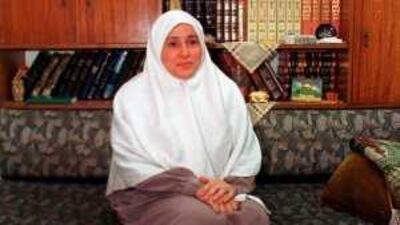CAIRO // The parliamentary representatives from the Muslim Brotherhood, Egypt's largest opposition political group, are a brotherhood in the strictest sense. But if the Islamist organisation has its way, elections in June to the Shura Council, the country's upper house of parliament, may add a few feminine faces to the organisation's all-male mix.
The 10 to 15 candidates the Brotherhood hopes to nominate may include two or three women, said a senior member of the organisation said this week. That would not be a first for the Brotherhood, which nominated a handful of female candidates in the 2000 and 2005 parliamentary elections. But despite substantial gains for the organisation as a whole in the 2005 vote, a Muslim sister has yet to win a seat.
Some of the Brotherhood's members blame their lack of female representation on Egypt's ruling regime. While Egypt's authorities have long used harsh measures to limit the success of the Brotherhood, an illegal but tolerated political organisation whose nominees must run as political independents, Brotherhood members have said the regime singles out its female politicians in a deliberate attempt to sustain the group's reputation as conservative and misogynistic.
"It was very evident that the presence of a woman affiliated to the Islamic trend is a redline for the state," said Jihan al Halafawy, the director of the department of women's studies at the independent Egyptian Centre for Media, Culture and Development. Ms al Halafawy has been a member of the Brotherhood for more than 30 years, and ran for a seat in the People's Assembly, Egypt's lower house of parliament, in 2000.
Ms al Halafawy said that despite winning that election, an administrative court decided that the vote was illegal based on procedural grounds. Following the decision, the seat for the Al Raml district of Alexandria remained vacant for two years before a special election awarded the seat to a nominee from the National Democratic Party (NDP), Egypt's ruling party. "The presence of women in such a position will make the real image of Islam very clear. The ruling regime doesn't want this to happen," she said.
But women's rights organisations counter that the Brotherhood's nomination of female candidates smacks of cynical tokenism meant to endear the organisation and its Islamist ideology to a more moderate Egyptian electorate and to western nations who fear the Brotherhood's large following. "They are using women and they discriminate against women, definitely," said Nehad Abu el Qomsan, the director of the Egyptian Centre for Women's Rights. "They deal with women as mommies, not as women. They are responsible for giving birth and breast feeding, but they are not trusted or qualified to be a part of the society involved with judges and decision-makers."
Nevertheless, the Brotherhood is "no better and no worse" than any other Egyptian political party when it comes to nominating women for elected office, said Ms el Qomsan. For the 2005 parliamentary elections, Ms el Qomsan said, the NDP nominated only six women. Of the 454 members of Egypt's National Assembly, there are only eight women, four of whom were appointed by Egypt's president, Hosni Mubarak.
In its most recent attempt at reform, legislators passed a law in mid-2009 that would reserve 64 seats for women in the Peoples' Assembly, but not in the Shura Council. The law will go into effect for the assembly vote this autumn. Ms el Qomsan said some of the Brotherhood's more explicit policy positions, published in 2005, reveal a worrying lack of tolerance. The group's policy paper states that while women should be treated equally in all spheres of public life, they should still be excluded from holding the offices of the presidency or the Grand Imam, Egypt's highest public religious authority.
The statement, which remains controversial, also stressed that the roles of women in public office should respect feminine "chastity, morality or honour". "It was a draft and until now there was no endorsement of such a draft," said Essam el Erian, a Brotherhood leader and former parliamentarian, of the 2005 Electoral Programme of the Muslim Brotherhood. "We are still discussing this and it is still one of the main issues that's being discussed inside the Muslim Brotherhood."
Though Ms al Halafawy said she disagreed with the Brotherhood's statement on women's roles in politics, she has never experienced misogyny during her 30 years of service to the group, she said. "This is a theological debate. One of the theological opinions is that women are not fit for the presidency, but for myself, I believe that women are fit to occupy the presidency," Ms Halafawy said. "I don't like it, but it doesn't reach the point of my taking offence because the regime in Egypt is so confused. No men or women have the right to nominate themselves for the presidency."
mbradley@thenational.ae

